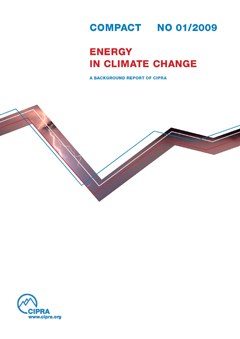News
The construction industry as a key to the problem of climate change
Dec 14, 2009
/
cc.alps
The information provided through cc.alps is now available in the form of focussed background reports called Compacts, which can be downloaded from the CIPRA website at www.cipra.org/de/cc.alps/ergebnisse/compacts . The first three Compacts - on Energy, Nature Protection, and Construction and Refurbishment - address their subjects with reference to climate change in the Alpine context. The authors list and analyse activities relating to climate change mitigation and adaptation, assessing them for sustainability, explaining the conflicts of interest involved, and presenting examples of good practice.
CIPRA also takes advantage of the Compacts to explain its own position and formulate clear demands.
In the framework of the cc.alps project, CIPRA is currently preparing further publications in the Compact series, which is designed to cover a wide range of subjects such as transport, energy-independent regions, spatial planning, tourism, natural hazards, agriculture, forestry and water. These Compacts will be available shortly and will make a useful addition to the alpMedia collection of dossiers. The first two Compacts - Energy and Nature Protection - are in English and German, while Construction and Refurbishment is in French, German, Italian and Slovene.
Energy in Climate Change: The authors take a critical look at energy consumption and energy production in the Alps and relate them to various national and regional strategies for climate change mitigation and adaptation. CIPRA's basic message is made very clear: Increased energy-efficiency is important but not enough if we are to limit global warming; we must also reduce energy consumption levels. And we must promote the use of renewable energies - proceeding with caution because renewable energy sources also have considerable potential for ecological conflict.
Nature Protection in Climate Change: Nature protection is a source of ecological enhancement for habitats in the Alps and protection against natural hazards for the people who live there. This CIPRA Compact offers an overview of nature protection measures in the Alps for climate change mitigation and adaptation. With the restoration of wetlands, near-natural silviculture, the revitalisation of rivers, and the creation of ecological networks, nature protection can make a significant contribution to climate change mitigation.
www.cipra.org/en/cc.alps (de/en)
Construction and Refurbishment in Climate Change: The refurbishment of existing buildings can make a decisive contribution to climate change mitigation, and for new buildings the passive house standard is to be introduced throughout the Alps. The house of the future will actually produce its own energy! To ensure faster progress in establishing climate-friendly methods of construction and refurbishment, public authorities are called upon to provide more incentives and also to set a good example with their own buildings. This is CIPRA's primary concern in the context of construction and refurbishment. This Compact focuses on the interrelationships between construction and climate change and presents examples of good practice for climate-friendly construction and refurbishment in the Alps.
www.cipra.org/en/cc.alps (de/it/fr/sl)
In the framework of the cc.alps project, CIPRA is currently preparing further publications in the Compact series, which is designed to cover a wide range of subjects such as transport, energy-independent regions, spatial planning, tourism, natural hazards, agriculture, forestry and water. These Compacts will be available shortly and will make a useful addition to the alpMedia collection of dossiers. The first two Compacts - Energy and Nature Protection - are in English and German, while Construction and Refurbishment is in French, German, Italian and Slovene.
Energy in Climate Change: The authors take a critical look at energy consumption and energy production in the Alps and relate them to various national and regional strategies for climate change mitigation and adaptation. CIPRA's basic message is made very clear: Increased energy-efficiency is important but not enough if we are to limit global warming; we must also reduce energy consumption levels. And we must promote the use of renewable energies - proceeding with caution because renewable energy sources also have considerable potential for ecological conflict.
Nature Protection in Climate Change: Nature protection is a source of ecological enhancement for habitats in the Alps and protection against natural hazards for the people who live there. This CIPRA Compact offers an overview of nature protection measures in the Alps for climate change mitigation and adaptation. With the restoration of wetlands, near-natural silviculture, the revitalisation of rivers, and the creation of ecological networks, nature protection can make a significant contribution to climate change mitigation.
www.cipra.org/en/cc.alps (de/en)
Construction and Refurbishment in Climate Change: The refurbishment of existing buildings can make a decisive contribution to climate change mitigation, and for new buildings the passive house standard is to be introduced throughout the Alps. The house of the future will actually produce its own energy! To ensure faster progress in establishing climate-friendly methods of construction and refurbishment, public authorities are called upon to provide more incentives and also to set a good example with their own buildings. This is CIPRA's primary concern in the context of construction and refurbishment. This Compact focuses on the interrelationships between construction and climate change and presents examples of good practice for climate-friendly construction and refurbishment in the Alps.
www.cipra.org/en/cc.alps (de/it/fr/sl)


